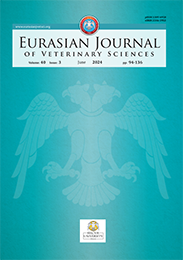| 1985, Cilt 1, Sayı 1, Sayfa(lar) 025-033 |
| [ Türkçe Özet ] [ PDF ] |
| The studies on the preservation of deodorized ground anchovy in deep- freeze and the effects of freezing temperature on its microbiological and chemical qualities |
| Nazif ANIL |
| S. Ü. Veteriner Frukültesi, Besin Hijyeni ve Teknolojisi Anabilim Dalı, Konya - Turkey |
| Downloaded:1711 - Viewed: 3194 |
|
This study was carried out in two stages. At first, the
anchovy fish w as eleane d off, grounded and deodorized. Later, they were
analyzed arter being packed in the polyethylene pouches and stored in deep- freeze at- 18=F2°C for the periods of 7 days, 1, 8 and 6 months.
The chemical and microbiological e·xperiments were conducted on fresh anchovy and frozen grouıid anchovy. The values of pH (average 5.7±0.04) and water activity (average 0.98±0.01) determined in fresh anchovy didn't show any significant differences with compared to those of ground anchovy. On the other hand, a decrease in the percentage of total acidity (average %0.88 ± 0.05 →+ %0.75), but an increase in the peroxide number (average 1.25 ± 0.43 → 6.7) were observed towards to the end of the storage periods. Thus, it was realized that the rancidity has undergone to develop even at ·the freezing temperatures. The total gemı counts determined in fresh anchovy (1.15x107/gr) have decreased down to 7.51x105/gr in frozen anchovy. The same situation was also observed in other microorganisms. No growth was seen in coliform microorganism in the 6th month. However, the nurnerical drops of psychrophilic microorganisms were found to be not so obvious. As a result, it was determined that the freezing temperature didn't cause any significant side effect on the chemical and microbiological quality of ground anchovy during the extended storages in. deep-freeze. On the contrary, it was understood that the. low degree of freezing tem- perature has caused a mild sterilization effect on microorganisms. Thus, it became clear that the ground anchovy could be safely preserved at -18°C for at least 6 months. |
| [ Türkçe Özet ] [ PDF ] |





